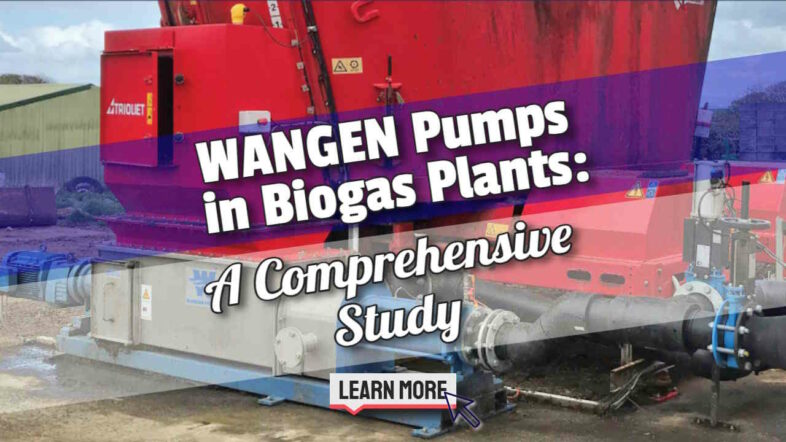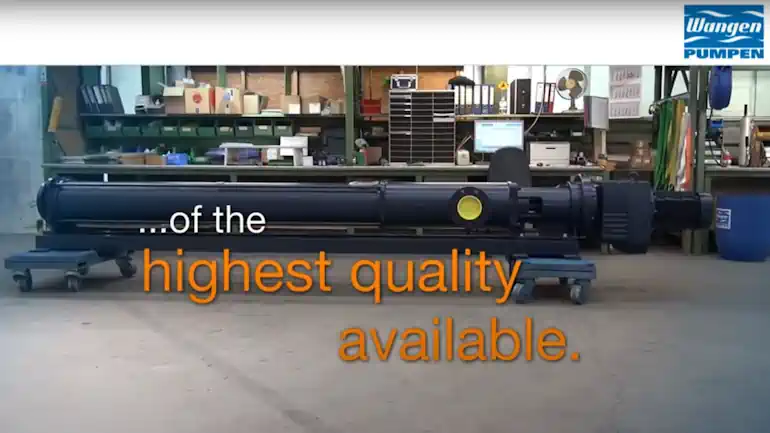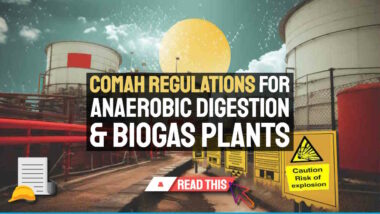Are you struggling to optimise the performance of your biogas plant and unsure about which pump system to employ? The use of WANGEN pumps in such facilities has been transforming the process of anaerobic digestion globally for many years.
This comprehensive study delves into how these advanced pieces of equipment efficiently convey viscous substrates, ensuring optimum production for biogas plants. Let's unveil this game-changer in the world of renewable energy!
[boomdevs_toc]
Key Takeaways
- WANGEN BIO-MIX Hopper feed pumps are highly effective in preparing incoming feed materials and conveying substrates into digester tanks in biogas plants, ensuring improved productivity and quality.
- WANGEN progressive cavity pumps efficiently handle the Digestate/Slurry pumping in the conveying of viscous digestate between fermenters, reducing maintenance costs, optimizing transportation, and minimizing downtime which might otherwise be caused by blockages.
- WANGEN progressive cavity pumps play a crucial role in loading digestate screw separators by maintaining a consistent flow of substrates, without clogging issues, and reducing digestate handling costs.
Importance of Pumps in Biogas Plants
Pumps play a crucial role in biogas plants by:
- preparing incoming feed materials, including feeding in solid material
- conveying substrates into and between digester tanks
- loading commonly used digestate screw separators.
If the AD pumps are not right in a biogas plant there is little hope of successful energy production.
Preparing incoming feed materials, conveying substrate into and between the digester tanks
Understanding the process of preparing incoming feed materials and conveying substrates into the digester tanks is an essential part of operating biogas plants. Here is a step-by-step guide:
- Incoming feed materials such as animal manure, food waste, or energy crops are first collected in a separate feedstock storage area.
- The collected feed material undergoes pre-processing where it's mechanically crushed and blended to create a homogenous mixture.
- Modern equipment like WANGEN BIO-MIX pumps prove instrumental in this phase, offering seamless operation with even highly viscous substrates.
- WANGEN application-optimized pumps spring into action, effectively handling this viscous substrate.
- These pumps transport the prepared substrate from its original location to the digester tanks where anaerobic digestion occurs.
- The performance of these pumps ensures a steady supply of feedstock for continuous biogas production.
- The WANGEN BIO-MIX pump, specially designed for this task, effectively handles abrasive or viscous materials commonly found in feedstock for anaerobic digestion systems.
- WANGEN PUMPEN BIO-MIX substrate feeding systems, having been successful in several Northern Ireland plants, prove effective in managing digester input materials during separation phases.
Loading the digestate separators
WANGEN progressive cavity pumps once again play a crucial role in the efficient operation of biogas plants in loading the digestate separators, such as the popular models of screw separators used to press out the solid matter in the digestate from the liquid. Here are some ways they make this process more effective:
- WANGEN pumps handle heavy-duty tasks where high-viscosity or abrasive materials need to be separated.
- They help to maintain a consistent and smooth flow of substrates into the separators.
- With their robust design, these pumps avoid clogging issues that can slow down operations.
- Operators experience less downtime due to maintenance as WANGEN pumps are designed for long service life.
- Their integrated PLC controls allow for seamless integration with other systems in the plant.
- Efficient transportation distances within the plant are achieved thanks to their strong pumping power.
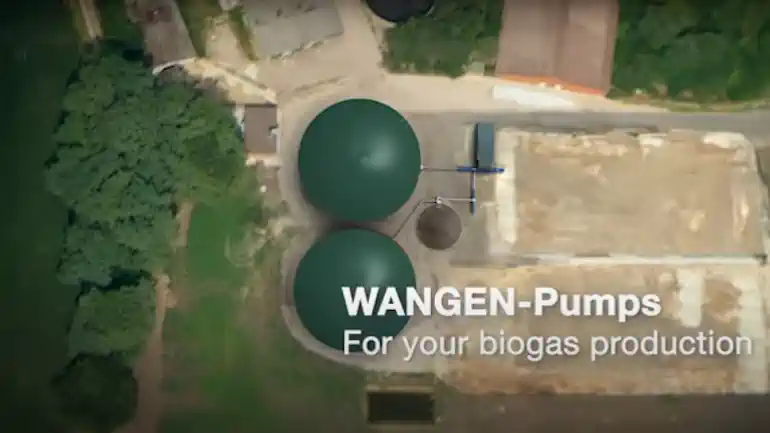
WANGEN Pumps for Biogas Plants
WANGEN Pumps are highly effective and reliable pumps specifically designed for biogas plants, offering numerous benefits and advantages over conventional pump systems.
Overview of WANGEN Pumps
WANGEN pumps are specifically designed for use in biogas plants and anaerobic digestion processes. These pumps play a crucial role in conveying viscous substrates between fermenters, ensuring the smooth operation of the biogas production system.
WANGEN offers a range of application-optimized pump types that can handle different types of substrates with efficiency and precision. From their BIO-MIX substrate feeding systems to central pumps for biogas plants, WANGEN pumps have proven track records in driving sustainable biogas production worldwide.
With their expertise and well-founded knowledge, WANGEN provides valuable assistance to optimize biogas production and usage for plant operators. Additionally, these pumps are also utilized as booster pumps and compressors in biogas plants, further enhancing productivity and efficiency.
Benefits of WANGEN Pumps
WANGEN pumps offer numerous benefits for biogas plant owners and operators. Firstly, these pumps are designed to handle viscous substrates efficiently, making them ideal for conveying materials between fermenters in anaerobic digestion processes.
Secondly, WANGEN pumps are application-optimized and can be tailored to handle specific types of substrates, ensuring optimal performance and reducing maintenance costs. Additionally, WANGEN BIO-MIX pumps have a proven track record of success in leading anaerobic digestion plants globally, offering reliability and durability.
Lastly, the utilization of WANGEN pumps contributes to increased productivity, improved quality, and enhanced precision in biogas plants and anaerobic digestion processes.
Comparison of WANGEN BIO-MIX Pumps with Vogelsgang and Weltec substrate feed systems
The physical differences between WANGEN BIO-MIX Pumps and centrifugal pumps include service life, operating track record, operating costs, and area of application.
Physical differences between WANGEN Pumps and centrifugal pumps
Understanding the physical differences between WANGEN Pumps and centrifugal pumps is essential in determining their suitability for specific applications in biogas plants. Below is a comparative table that provides an overview of these physical differences.
| WANGEN Progressive Cavity Pumps | Centrifugal Pumps | |
|---|---|---|
| Design | Designed with progressing cavity technology which provides a precise and steady, low-pulse flow independent of pressure head. | Designed with impeller technology which requires rapid wear-inducing rotation and flow is dependent upon the pressure head. |
| Flow Rate | Offers a constant flow rate, making them ideal for viscous substrates. | The flow rate varies with changes in pressure, making them less suitable for handling viscous fluids. |
| Care & Maintenance | Requires minimal maintenance and is less prone to wear and tear due to the absence of impellers. | Requires regular maintenance and is prone to wear and tear due to continued contact with the abrasive pumped media. Some models may clog due to fibre build-up at the entry point. |
| Suitability | Suitable for handling thick and abrasive materials such as the substrates used in biogas plants. | Not as suitable for handling viscous and abrasive materials, limiting their applications in biogas plants. Large gap required between the outside of the impeller and the casing results in low pump efficiencies. Fibres (especially textiles) may become entangled in the impeller. |
| Application Area | Extensively used in various sectors including biogas and agricultural technology, food and beverage, and wastewater and sewage technology. | Suitable for water distribution systems, HVAC, and industrial applications. |
Thus, it can be seen that the physical characteristics of WANGEN pumps make them more suitable for use in biogas plants compared to centrifugal pumps. By choosing WANGEN pumps, operators can ensure a more efficient and productive operation.
Service life, operating track record, operating costs, and area of application
When investing in biogas technology, it is essential to consider factors such as service life, operating track record, operating costs and areas of application of the equipment. WANGEN Pumps, known for their durability, efficiency and broad application range, has proven to be a wise investment for biogas and anaerobic digestion plants worldwide.
Below is a detailed comparison of WANGEN BIO-MIX pumps with other substrate feed systems in terms of service life, operating track record, operating costs and areas of application.
| Item | WANGEN BIO-MIX Pumps | ||
|---|---|---|---|
| Technology | Hopper and Augur are fed with progressive cavity pumps. | ||
| Service Life | WANGEN pumps are known for their long service life, reducing the need for frequent replacements and maintenance. | ||
| Operating Track Record
Operating Costs | The successful implementation of WANGEN BIO-MIX pumps in many leading anaerobic digestion plants in Northern Ireland and China is a testament to their impressive track record. WANGEN BIO-MIX pumps offer low operating costs, contributing to the overall cost-efficiency of the biogas plants. | ||
| Area of Application | WANGEN pumps are used globally in various sectors, including biogas and agricultural technology, food and beverage, wastewater and sewage technology, and chemicals, demonstrating their wide area of application. |
By choosing WANGEN pumps, biogas plant operators can expect a “best in class” service life, an impressive operating track record, lower operating costs, and a broad area of application, thereby optimising their biogas production and usage.
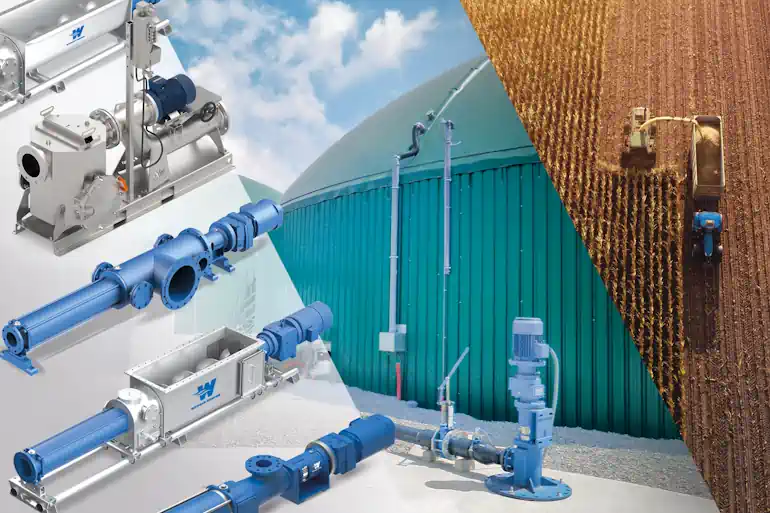
Case Study: Success with WANGEN BIO-MIX Pumps
Leading anaerobic digestion plants in Ireland and Northern Ireland have experienced remarkable success with the implementation of WANGEN BIO-MIX pumps. These pumps, specifically designed to handle viscous substrates, have played a crucial role in driving sustainable biogas production in the region.
Another satisfied buyer has been reported in Dongying, China.
The use of WANGEN pumps as the main process pumps in biogas plants has significantly improved the conveying of mixed media between fermenters, leading to increased productivity and enhanced dosing precision. This means that the biomass is fed regularly and becomes more active raising the biogas output and the stability of the digester.
The success achieved with WANGEN BIO-MIX pumps is not limited to Ireland and Northern Ireland alone. These reliable pumps are used globally and in China in various sectors such as biogas and agricultural technology, food and beverage, wastewater and sewage technology, and chemicals.
This widespread usage underscores their effectiveness and versatility in different applications.
Biogas plant operators can benefit from impartial assistance provided by WANGEN based on well-founded knowledge and academic research. This enables them to optimize biogas production and usage, contributing to improved quality while reducing greenhouse gas emissions.
Overall, the case study on the success achieved with WANGEN BIO-MIX Pumps highlights their critical role in driving sustainable biogas production worldwide. With their exceptional performance capabilities, these pumps continue to contribute towards renewable energy goals while ensuring optimal operations within anaerobic digestion processes.
Other Applications of WANGEN Pumps
WANGEN Pumps probably also find applications in ABP pathogen-free fertilizers and soil improvers, digester wastewater treatment, anaerobic digestion, wastewater treatment, and the food industry.
Water Treatment Industry Wastewater Treatment
 WANGEN pumps are just as instrumental in the treatment of sludges produced during wastewater treatment at Wastewater Treatment Works (Sewage Works) as from digesters in agricultural biogas plants.
WANGEN pumps are just as instrumental in the treatment of sludges produced during wastewater treatment at Wastewater Treatment Works (Sewage Works) as from digesters in agricultural biogas plants.
They efficiently handle the transportation and processing of wastewater sludges to ensure optimal biogas output and environmental sustainability of Wastewater Treatment Works.
These pumps are also routinely installed at sewage works. Examples of key applications are:
- Pumps for mechanical and biological wastewater treatment
- Pumps for sludge dewatering and sludge drying
- Pumps for process materials dosing.
Source: WANGEN pumps in wastewater sewage treatment.
Anaerobic Digestion and Why Reliable Pumps are Vital for its Success
Anaerobic digestion is the crucial process at- ork in all biogas plants that involves the breakdown of organic materials in the absence of oxygen. It plays a vital role in the production of methane gas, which can be used as a renewable energy source.
WANGEN pumps have proven to be highly effective in facilitating anaerobic digestion and optimizing biogas production. With their application-optimized design, these pumps ensure the smooth conveyance of viscous substrates between fermenters, leading to increased productivity and improved quality.
Biogas plant operators can rely on WANGEN's extensive knowledge and research to optimize their anaerobic digestion processes and achieve sustainable biogas production. Furthermore, WANGEN pumps also serve as biogas booster pumps and compressors, enhancing overall efficiency and productivity in biogas plants. Their utilization contributes to reducing greenhouse gas emissions and promoting a greener future.
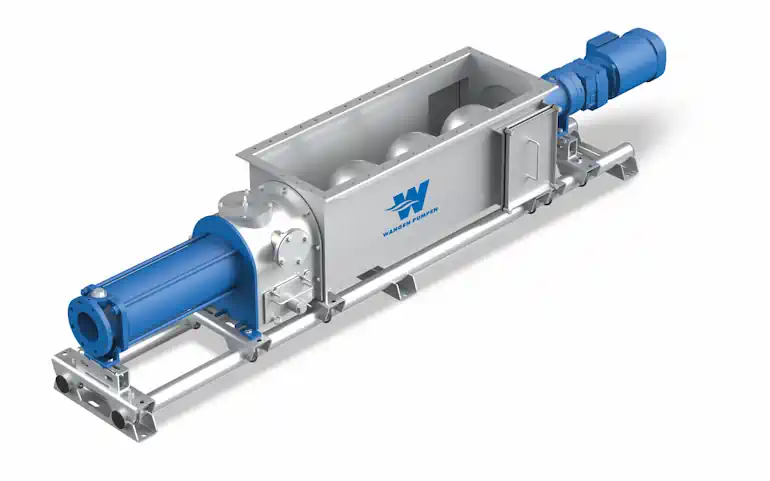
Food Industry and Other Processes
WANGEN pumps are not only essential for biogas plants and anaerobic digestion processes but also find wide application in the food industry and other processes. Here are some key areas where WANGEN pumps play a crucial role:
- Processing and Conveying Food Products: WANGEN pumps are used to handle viscous food products, such as sauces, creams, yoghurt, and dough. These pumps ensure the efficient transfer of ingredients during food processing.
- Beverage Production: From juices and smoothies to dairy-based drinks, WANGEN pumps enable the smooth conveyance of liquid ingredients without compromising taste or quality.
- Chemical Industry: WANGEN pumps are employed for the safe transfer of chemicals in various industrial processes. Their design ensures precise dosing and reliable performance, even when handling corrosive or abrasive substances.
- Pharmaceutical Manufacturing: Pharmaceuticals often require precise dosing and gentle handling during production. WANGEN pumps offer the necessary accuracy and reliability for the pharmaceutical industry's stringent requirements.
- Cosmetics Industry: When it comes to manufacturing cosmetics like lotions, shampoos, and creams, WANGEN pumps provide consistent performance in conveying various ingredients with different viscosities.
- Renewable Energy Production: Apart from biogas plants, WANGEN pumps find use in other renewable energy sectors such as biomass power plants and biofuel production facilities.
- Chemical Injection Systems: In chemical injection systems used across industries like oil and gas production or power generation, WANGEN pumps deliver reliable performance in safely injecting chemicals into pipelines or process streams.
- Agriculture Sector: From fertilizers to irrigation systems, agriculture benefits from the efficiency of WANGEN pumps in delivering solutions for various agricultural processes.
- Mining and Minerals Processing: WANGEN pumps are used to transport thick slurry in mining and minerals processing, ensuring efficient extraction and separation of valuable minerals.
Trade Shows and Live Presentations
Opportunities to Experience WANGEN Pumps first-hand are available through trade shows and live presentations.
Opportunities to Experience WANGEN Pumps first hand
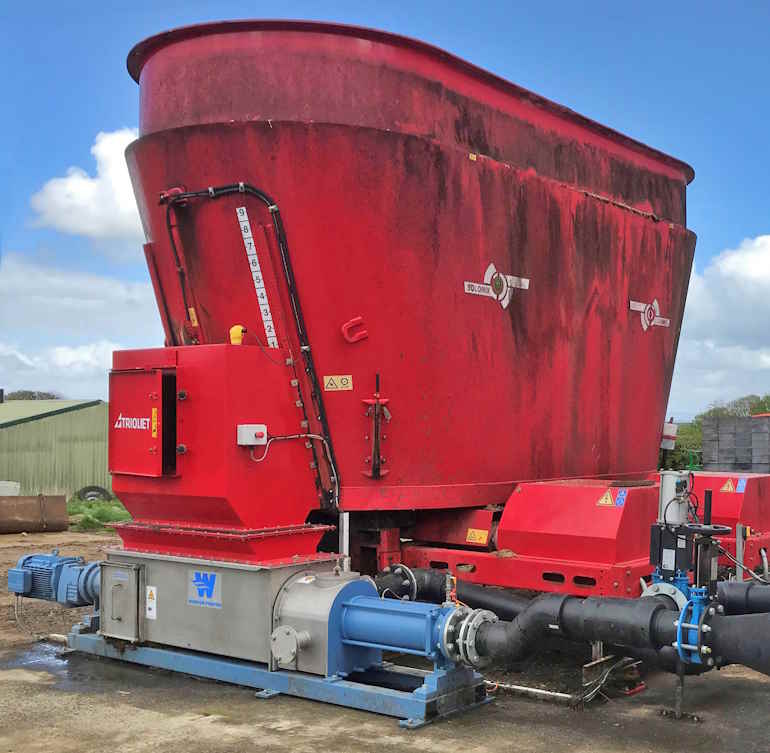
If you are a biogas plant owner or operator, an environmental scientist, an engineer, or even a renewable energy enthusiast, there are opportunities for you to experience WANGEN pumps firsthand.
Whether it's attending trade shows or live presentations, you can witness the efficiency and precision of these pumps in action. Additionally, educational institutions and equipment suppliers may also provide opportunities to learn more about WANGEN pump technology and its applications in various sectors like agriculture and wastewater treatment.
Conclusion
In conclusion, the comprehensive study on the applications of WANGEN pumps in biogas plants highlights their crucial role in optimizing biogas production and usage. These pumps are specifically designed to handle viscous substrates, and slurries (viscous mixtures of liquids and solids including fibres), making them an invaluable asset for biogas plant operators.
With their efficiency and reliability, WANGEN pumps contribute to increased productivity and improved quality in anaerobic digestion processes. Incorporating WANGEN pumps into biogas plants is a sustainable solution that aligns with global efforts towards renewable energy and waste management.
FAQs
1. What are some common applications of WANGEN pumps in biogas plants?
WANGEN pumps are commonly used in biogas plants for tasks such as transferring and mixing substrates, pumping liquid digestate, feeding biomasses into the fermenter, and recirculating substrate.
2. Can WANGEN pumps handle abrasive or corrosive materials found in biogas plants?
Yes, WANGEN pumps are designed to handle a wide range of materials including abrasive substances like straw or wood chips, as well as corrosive liquids such as sulfuric acid or ammonia.
3. How do WANGEN pumps contribute to the efficiency of biogas plants?
WANGEN pumps are known for their high efficiency and reliability. By effectively transferring substrates and digestate, they help maintain optimal fermentation conditions and improve overall plant performance.
4. Are there any specific maintenance requirements for WANGEN pumps used in biogas plants?
Regular maintenance is important to ensure the longevity and performance of WANGEN pumps in biogas plants. This may include cleaning debris from pump components, checking seals and bearings, and monitoring motor performance for any signs of wear or damage.


